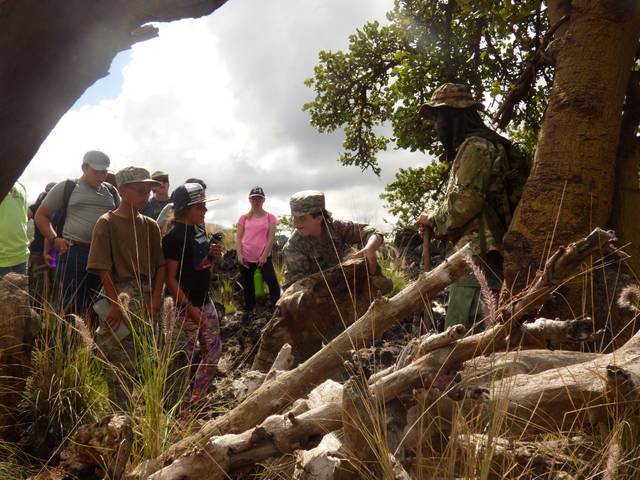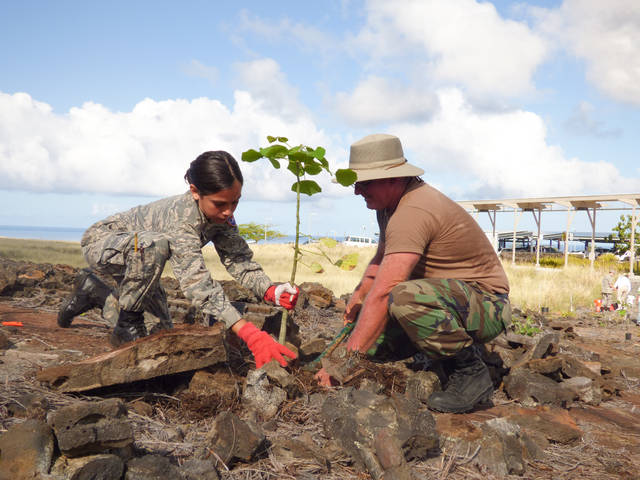KAILUA-KONA — When Cadet Airman 1st class Ariihau Barton came to Hawaii Community College-Palamanui on Saturday, he didn’t know the full story of what was happening in the dry forest above the campus.
But over the course of taking part in a restoration effort with the Kona Composite Squadron of the Civil Air Patrol, he learned about the impact the region’s feral goats were having on the plants in the area, the risk the native wiliwili trees faced and the importance of doing his part.
“I believe that the land should be cared for more,” said the 13-year-old as he pulled fountain grass from near the trees, “and that people should think about what’s happening over here.”
As he and his fellow cadets worked to make space for native trees to grow and thrive, he said he’s glad to know how much effort people are putting in to restore the land.
“It makes me happy,” he said, “because I know that there are a lot of people who care about the land.”
Barton was one of about 20 cadets from the Kona Composite Squadron of the Civil Air Patrol who came to the campus to take part in the day’s restoration efforts around the campus.
Lucia Dauchy, who organized Saturday’s event, said she felt it would be a good activity as it’s giving back to the community.
“It’s a huge part of life when you’re growing and looking outside yourself to the rest of the world,” she said. “We go through that stage of being inside of just ‘us, us, us, us,’ and then all of a sudden: ‘Oh, wow, there’s other people and other things out there.’ And I think this is a huge part of that.”
The cadets make up the latest group from this community and beyond to contribute in restoring trails and the dry forest around the North Kona campus.
Palamanui lecturer Richard Stevens said since trail restoration efforts started in 2014, at least 2,000 people from 15-20 organizations have pitched in. Last week, 120 fifth-graders from Kahakai Elementary School planted wiliwili seeds in a demonstration trail garden just south of the campus.
As Stevens walked through the garden Saturday, he pointed to the first wiliwili seedling that had sprouted. Yards away, he pointed out, uhaloa are naturally regenerating in the area.
The seeds that are now bringing new life to the area, Stevens said, were “just waiting for us to do our part.”
“We all seek purpose in life,” he said, “and it’s just so obvious that when you’re working to restore the aina, when you’re bringing native forest back to its place, when you’re giving life again to the old trails, that it’s just so much meaning in all of that — deep meaning.”
Cadet Chief Master Sgt. Ruby Mandini, 14, said she thinks the restoration efforts should be a community undertaking and that she’s happy to hear how many people have been getting involved.
“And I just really hope that it maintains to keep growing,” she said. “And that more people are aware of this and they keep helping.”
She added she hopes the community is inspired by seeing young people take an interest in restoring the landscape and getting involved.
“Hopefully, it will show them that they have the power to be able to impact things as well,” she said, “and that if kids are being able to do it then they are able to do it and that it just informs them like, ‘Wow, these kids are doing this, why don’t we do it?’”
Before the cadets headed into the grove to clear around the trail, each of them also had an opportunity to plant wiliwili or kou in the demonstration garden.
With the cadets gathered around the trees they’d soon put into the ground, Stevens asked them to dedicate the tree to someone special, a request he makes of everyone with whom he plants a tree.
“It becomes a forest of loved souls,” he said, “that when you look at a forest that’s had all those trees dedicated to it, you’re really looking at the people who have had the trees dedicated for them, and it just glows with this being a forest of loved souls.”
Up at the grove, Stevens encouraged the cadets to collect some seeds from the wiliwili trees now thriving in the area.
Before leaving the campus Mandini said she hopes her fellow cadets recognize the impact they can have on the land, take home some seeds they collected and plant them into the ground.
“I’m going to try to plant a few,” she said. “Hopefully, they grow.”




